A Jewish Thanksgiving Message: Covenant & Cornucopia 
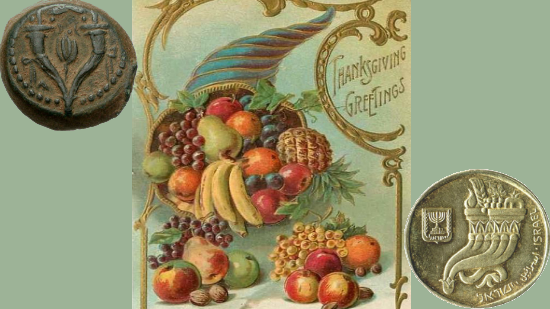
“Bendigamos al Altísimo,
Al Señor que nos crió,
Démosle agradecimiento
(“Let us bless the Most High/ The Lord who created us,/ Let us give Him thanks/ For the good things He has given us.”)
Happy Thanksgiving from your friends at
The American Sephardi Federation
In honor of Thanksgiving, the ASF’s Sephardi World Weekly is pleased to offer the following “Letter from the Land of Israel”:
Professor Daniel J. Elazar (1934-1999) served as the first President of the American Sephardi Federation from 1973-75 and enjoyed a highly successful career as a political theorist, specializing in the Jewish political tradition and Federalism. A proponent of Classic Sephardic Judaism, Prof. Elazar also studied various issues connected to Israel and world Jewry before making Aliyah to Israel, where he founded and served as President of the Jerusalem Center for Public Affairs (now known as the Jerusalem Center for Security & Foreign Affairs).
Prof. Elazar thought deeply about the American experience and its connection to the Bible. A fascinating example of the connection between the two emerges in his thoughts on Thanksgiving.
One of the central ideas of Prof. Elazar’s thought was the concept of “covenant.” He even devoted a monumental four-volume series, The Covenant Tradition in Politics, to investigating the meaning and historical impact of the concept. While the idea of covenant was born in ancient Israel, Prof. Elazar argued that it still exerted a deep influence down through modern times, especially in the Founding of the United States: “The idea of separation of powers, especially among equals… is a product of covenantal political culture.”
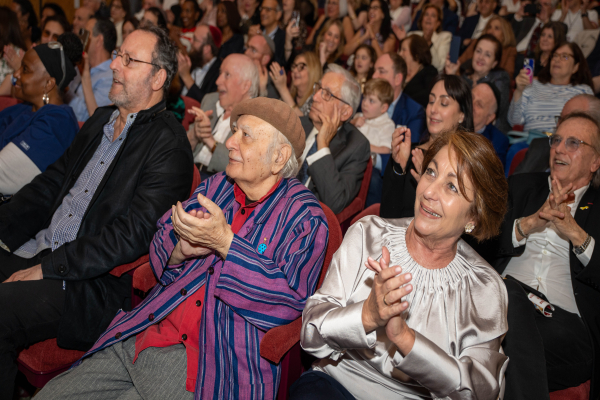
In the third volume of his series, Covenant and the American Founding, Prof. Elazar treated the holiday of Thanksgiving. Together with Independence Day, he called the November holiday, one of “two major covenantal celebrations that persist into the postmodern epoch.”
What makes Thanksgiving so special? According to Prof. Elazar, Thanksgiving “is the premier national holiday because of what it combines and what it excludes. It combines both religious and patriotic sentiments in proper proportion.” This blending of religious and national dimensions characterized Biblical Israel, and it likewise characterized the original American point of departure when the Puritans arrived in their New Israel.
What’s more, Prof. Elazar points out how the religious dimension of Thanksgiving possesses its own uniquely American character: Thanksgiving “celebrates not only the American civil religion but the religious character of the American people, yet it is not identified with any specific religion or religious denomination.” The religious content of Thanksgiving is universal, not particular, i.e., Jewish, Christian, or Muslim. Anyone and everyone desiring to give thanks to the mysterious source of the American bounty is invited to participate in the holiday as an American. One does not even need to be religious to participate in the holiday, simply thankful: “Thanksgiving is not strictly religious just as it is certainly not strictly civil.” Ultimately, writes Prof. Elazar, “Each generation can develop its own combination of the two.”
Prof. Elazar’s thoughts on Thanksgiving stimulate the reader to a deeper appreciation of the unique character of Thanksgiving and, in a sense, the unique character of the American project. This Thanksgiving Holiday, we invite you to join us in giving thanks to the mysterious Providential power responsible for the improbable flourishing of American Sepharadim and, indeed, all Jewish communities in the United States from 1654 to the present.
As Jews are being threatened and attacked in our streets and on our college campuses, some may be dismissive about giving thanks. This would be a grave mistake. We must, as Dr. Mijal Bitton said at the March for Israel, “thank God that America and Israel changed the world and became our safe havens.” We must also always ensure that the United States of America, the “extraordinary country that has blessed us,” remains the world’s indispensable beacon and guarantor of liberty.
The American Sephardi Federation is always grateful for the opportunity to serve you and we ask for your support to accelerate the saving and sharing of Sephardi history, ideas, and culture. They are all essential for the Jewish future. Especially at this challenging time, we also ask you to contribute to our courageous and inspiring Sephardi House Fellows, who are on the frontlines resisting antisemitism. Together, let us give thanks and pray for a bountiful and peaceful year ahead.
“!תקבל ברחמים וברצון תפלתנו”
“May our prayer be accepted with loving favor!”*
The American Sephardi Federation

*Rev. David De Sola Pool, “Service for Thanksgiving Day” (The Union of Sephardi Congregations, New York, 1945), 15.
~~~~~~~
Bendigamos (“Let us bless”)
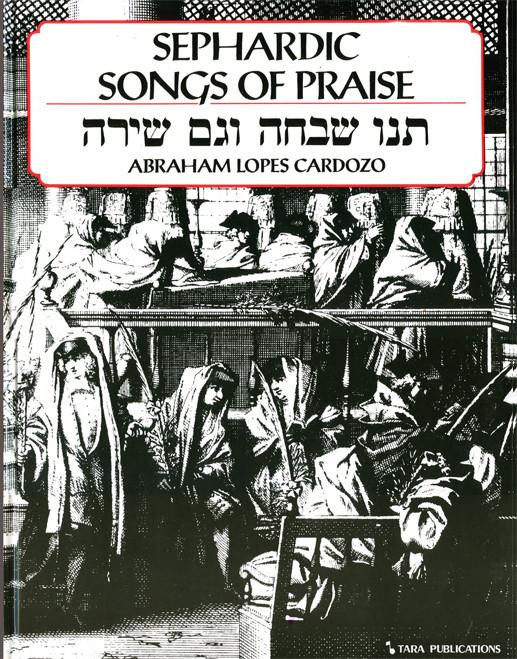
(Cover photo courtesy of JewishMusic)
Believed to have come to the United States from France via Curaçao and Jamaica, Bendigamos (translation) is a traditional Sephardic song of thanksgiving after a meal. In this recording, Rev. Abraham Lopes Cardozo, A”H, Hazzan of Congregation Shearith Israel: The Spanish and Portuguese Synagogue at New York from 1946-1986, sings the hymn according to the Western Sephardic tradition.
~~~~~~~
Image credit: The historical and contemporary cornucopia or “horns of plenty” as represented by a Maccabean coin of Yoḥanan Hurqanos, a vintage Thanksgiving greeting card, and a modern Israeli shekel coin.
~~~~~~~
Upcoming Events or Opportunities
The World Jewish Congress – North America, American Sephardi Federation, the Permanent Mission of Israel to the United Nations, Israel’s Consulate General at New York, and the Moise Safra Center present:
Remembering The Forgotten Jewish Refugees: The Next Generation
A commemoration of the mass exodus and expulsion of Jews from Arab and Islamic lands in the 20th century and its impact on present-day antisemitism. The event will feature:
Amb. Jonathan Miller (Permanent Mission of Israel to the United Nations)
Deputy CG Tsach Saar (Consulate General of Israel at New York)
Justice of NYS Supreme Court, Hon. Mojgan Cohanim Lancman
Activist, attorney, and author Adela Cojab Moadeb
Greater Sephardi Young Leaders: Abraham Hamra, Rabbi Isaac Choua, & Sara Aharon
ASF Sephardi House College Fellows: Nora Monasheri (Binghamton University), Rochelle Dweck (Syracuse University), Tehila Soleimani (Fashion Institute of Technology), & Yael Canaan (Carnegie Mellon University)
Yemenite-Israeli Music by Hila Yamini
Tuesday, 3 December at 6:00PM
@The Moise Safra Center (130 E 82nd St)
Sign-up Now!
Sephardic refreshments will be served
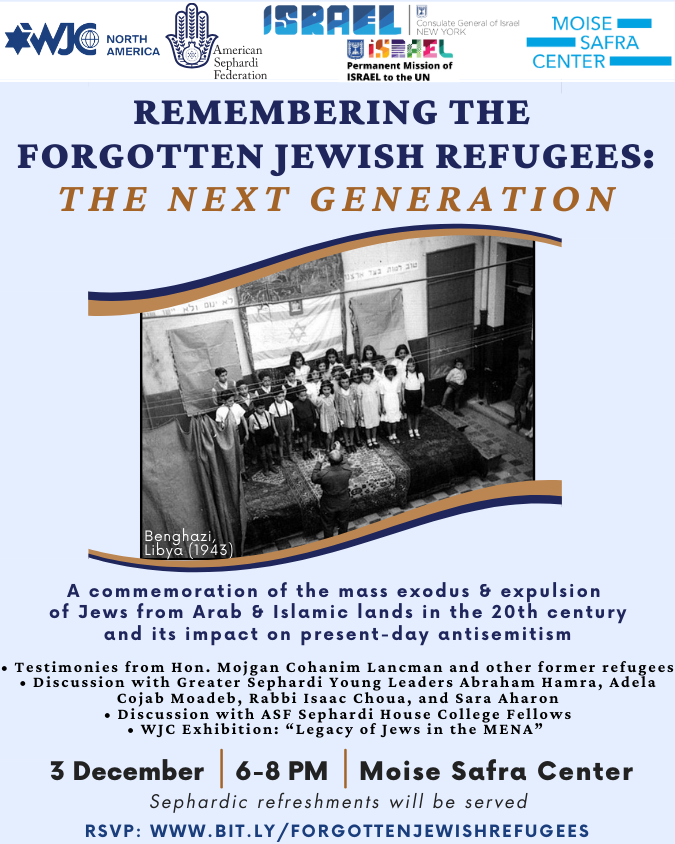
~~~~~~~
The Museum of the Bible presents:
The Afghan Liturgical Quire Speaker Series – Jewish History in Afghanistan
Join us to learn more about Afghanistan’s ancient Jewish community and its heritage and customs. Nestled on the Silk Roads, the Jews of Afghanistan lived in this mountainous land for as many as 2,700 years. Throughout its history, this small community’s livelihood was based on long-distance trade. Unusual domestic patterns developed to allow for long periods of time when men were away and women maintained households on their own. Influenced by the many peoples who surrounded them, Afghan Jews preserved their own distinct traditions and way of life.
This discussion will be led by ASF Board Member Osnat Gad, an Afghan Jewish community leader who has worked to preserve Jewish holy sites in Kabul and Herat, Dr. Sara Koplik, author of A Political and Economic History of the Jews of Afghanistan, and Jason Guberman, Executive Director of American Sephardi.
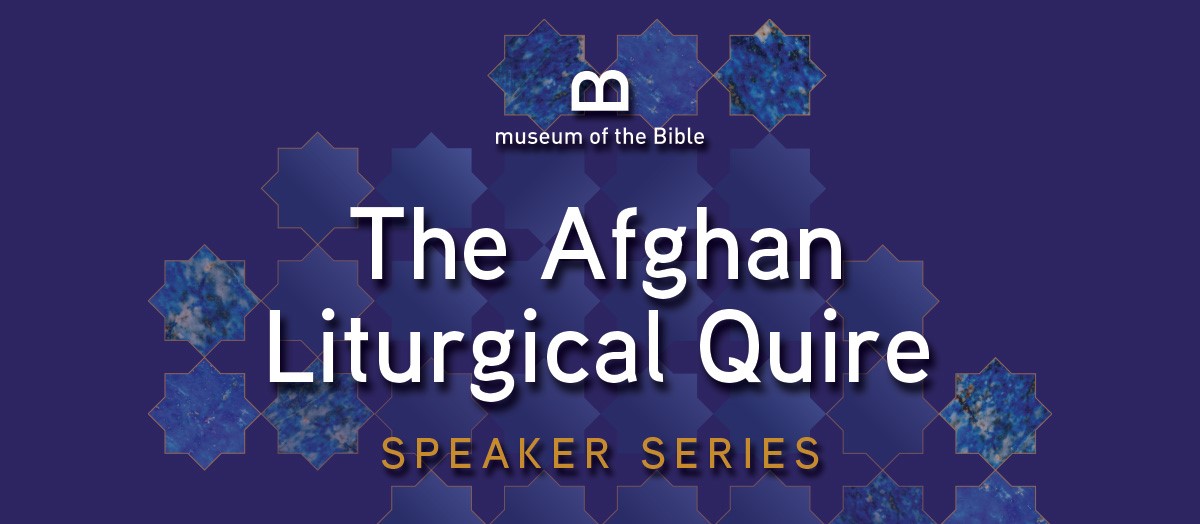
Sunday, 12 January at 3:30PM
Sign-up in-person!
Tickets: $24.99-$29.99
Sign-up on Zoom!
Tickets: $4.99-$9.99
These lectures will be held at the museum and on Zoom. Tickets for the event include general admission to the museum for those who want to see the Afghan Liturgical Quire on exhibit.